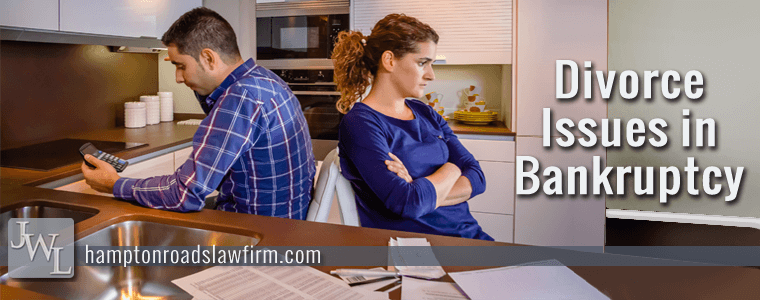By John Lee
Does divorce impact the bankruptcy process?
From time to time I represent a person in a bankruptcy that is going through a divorce or about to go through a divorce. When a person is contemplating a bankruptcy and divorce at the same time, there are special issues that need to be taken into consideration. Even if the divorce was finished in the recent past there still could be outstanding issues that need to be addressed in the bankruptcy.
Before I take the bankruptcy case, I try to determine if there is a possible conflict of interest. If I represented the Husband and Wife in the bankruptcy, then I may not be able to represent either one in the divorce. Generally speaking an attorney is not able to sue a former client, especially if he has relevant information from the previous representation. If the divorce is uncontested and there is no joint debt, then I generally don’t have a problem handling both a bankruptcy and a divorce. If I represent only one party in both the bankruptcy and divorce there is generally not a problem. If I represented the husband in the divorce and now the wife wants to bankrupt a debt owed to my former client, the husband, then, generally, I cannot take the bankruptcy case.
Generally speaking, a person is not liable for their spouse’s debts unless they co-signed for the debt. I often hear clients ask, “My husband just filed bankruptcy, will I be responsible for his bills?” You will not be responsible for your Husbands (or ex-husbands) bills unless you co-signed for them or they were bills of necessity, like a medical bill.
Most people know that child and spousal support debts are non-dischargeable in bankruptcy. What people are not familiar with, is that if you discharge a marital debt in bankruptcy, your spouse may be awarded spousal support to compensate her for having to pay the joint debts that you included in the bankruptcy. If the Divorce Court sees that you discharged $15,000.00 worth of joint credit cards, leaving your poor wife to pay the bill, then the Divorce Court may award her spousal support to help her pay for the marital debt you left her by filing bankruptcy.
Spousal support debt is not dischargeable, but Spousal Support, unlike child support, is not an exempt asset. That means the Chapter 7 Bankruptcy Trustee can take your spousal support and distribute it to your creditors. There is pending legislation that, if passed, would make spousal support an exempt asset.
Another key issue to consider when contemplating bankruptcy and divorce at the same time is household income. The bankruptcy court takes into consideration both spouses’ income and expenses to determine bankruptcy eligibility. Both spouses living together may have to file a Chapter 13 bankruptcy because they make too much money to file under Chapter 7 of the Bankruptcy Code. However, after they separate, one or both may qualify for a Chapter 7 bankruptcy because of the reduced household income and increased household expenses. This reduction in income may either help or hurt the debtor, depending on what his goals are. In some cases you may want to wait until after a separation, where your household income is less, so that you qualify for a Chapter 7 Bankruptcy. In other cases, you may want to file bankruptcy before the separation, because you need the wife and kids calculated into the household size to file the chapter that meets your goals.
If you are negotiating a separation agreement and know that you will be filing bankruptcy soon, then you want to avoid having any language in the agreement that makes you responsible for any marital debt. You also want to avoid having any generic language in the agreement that deals with future bankruptcy filings. If your separation agreement makes you responsible for paying a joint debt, and then you file bankruptcy against that debt, your former spouse may still be able to hold you liable for that debt.
If you have substantial equity in a house that is protected by your Tenants-by-the-Entirety exemption; then you do not want to get divorced until after you have filed for bankruptcy. The equity in the house is safe as long as you are married, but upon divorce you lose the exemption and could lose the house to the Chapter 7 Bankruptcy Trustee. In a case like this you would want to complete the bankruptcy before filing for divorce, or before you spouse files for divorce. The Trustee can hold a bankruptcy open until after the Equitable Distribution hearing to determine if the debtor will receive any un-exempt assets in the divorce proceedings.
Filing a bankruptcy does not remove a debtor’s name from the title of a house. If the debtor files for bankruptcy, the Bankruptcy Trustee does not administer the house for the unsecured creditors and the mortgage payments are still being paid, then the house still needs to be addressed in the subsequent divorce. A final decree of divorce or separation agreement that grants ownership of a house to one party does not transfer the deed into the other party’s name. Even after the divorce or separation that grants you the house, you still need to have a deed drafted to transfer title from joint ownership into your name.
Filing a bankruptcy and divorce at the same time can be complicated. If not done properly, you could easily lose assets and not obtain the full bankruptcy discharge. Instead of hiring two lawyers (one for your bankruptcy and a different one for your divorce), consider hiring the firm that can help you navigate through both areas of law. If you are contemplating bankruptcy and divorce, you should consult with one of the experienced attorneys at John W. Lee, PC. Our attorneys have years of experience in helping people plan for both bankruptcy and divorce.
This may be considered Advertising Material.


